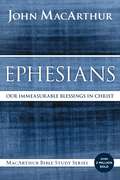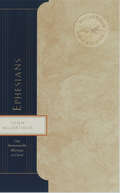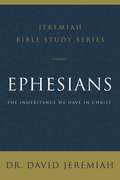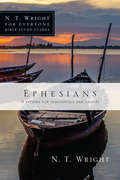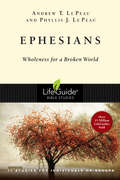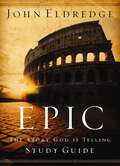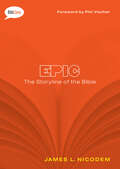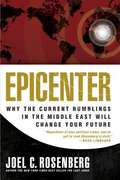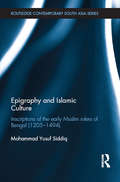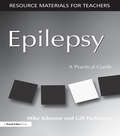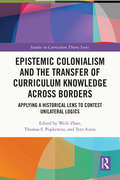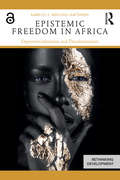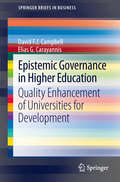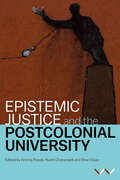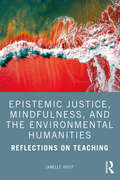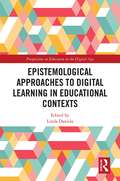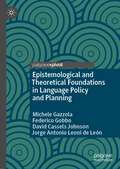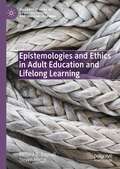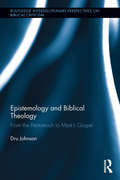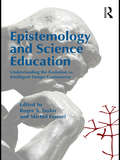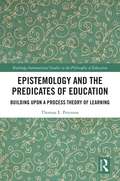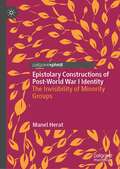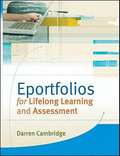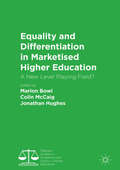- Table View
- List View
Ephesians: Our Immeasurable Blessings in Christ (MacArthur Bible Studies)
by John F. MacArthurSelf-satisfaction and complacency: these could very well be a Christian's greatest enemies. And these are the enemies that the apostle Paul addresses in his letter to the Ephesians. Pastor John MacArthur will take you through Ephesians, passage by passage, so that you can better understand the Christian encouragement and warnings in this book.When Paul wrote his letter to the believers in the city of Ephesus, he wrote to remind them of their immeasurable blessings in Jesus Christ and to admonish them to live in a manner worthy of them. Paul reminds them of the spiritual armor supplied through God's Word and by His Spirit, and of their need for vigilant and persistent prayer. —ABOUT THE SERIES—The MacArthur Bible Study series is designed to help you study the Word of God with guidance from widely respected pastor and author John MacArthur. Each guide provides intriguing examinations of the whole of Scripture by examining its parts and incorporates:Extensive, but straight-forward commentary on the text.Detailed observations on overriding themes, timelines, history, and context.Word and phrase studies to help you unlock the broader meaning and apply it to your life.Probing, interactive questions with plenty of space to write down your response and thoughts.
Ephesians: Our Immeasurable Blessings in Christ (MacArthur Bible Studies)
by John MacarthurThese first four study guides in a 16-volume set from noted Bible scholar John MacArthur take readers on a journey through biblical texts to discover what lies beneath the surface, focusing on meaning and context, and then reflecting on the explored passage or concept. With probing questions that guide the reader toward application, as well as ample space for journaling, The MacArthur Bible Studies are an invaluable tool for Bible students of all ages.
Ephesians: The Inheritance We Have in Christ (Jeremiah Bible Study Series)
by Dr. David JeremiahPaul's reminder of our identity in Christ...Follow Dr. Jeremiah through the letter of Ephesians in a chapter-by-chapter study that will help you understand what it meant to the people at the time it was written, and what it means to Christians today. Ephesus was located in a region where Christianity and pagan religions were clashing. However, the apostle Paul saw an opportunity to advance the kingdom of God. In the letter to the Ephesians, Paul walks believers through their spiritual inheritance in Christ. This inheritance moves them from death to life and into God's family—something so much better than anything they had in their former lives. Because of this, they need to "walk worthy of their calling," understand and use their spiritual gifts, and put on the armor of God.Each of this study's twelve lessons is clearly organized to include:Getting Started: An opening question to introduce you to the lesson.Setting the Stage: A short reflection to explain the context of the study.Exploring the Text: The Scripture reading for the lesson with related study questions.Reviewing the Story: Questions to help you identify key points in the reading.Applying the Message: Questions to help you apply the key ideas to their lives.Reflecting on the Meaning: A closing reflection on the key teachings in the lesson.—ABOUT THE SERIES—The Jeremiah Bible Study Series captures Dr. David Jeremiah's forty-plus years of commitment in teaching the Word of God. In each study, you'll gain insights into the text, identify key stories and themes, and be challenged to apply the truths you uncover to your life. By the end of each study, you'll come away with a clear and memorable understanding of that Bible book.Each study also contains a Leader's Guide.
Ephesians: The Prison Letters: Ephesians, Phillipians, Colossians And Philemon (N. T. Wright for Everyone Bible Study Guides)
by N. T. Wright Lin JohnsonHave you noticed how sometimes you have a story in the back of your mind that keeps coming up, even when you're talking about something else? In Ephesians, throughout its worship, prayers and instructions for living, Paul can't contain his joy and amazement at the larger story of God's plan to save us in Jesus the Messiah. These eleven studies from Tom Wright will help us see the significance of our role in God's grand narrative, and encourage us to live more fully as people who are lavishly loved by God. This guide by Tom Wright can be used on its own or alongside his New Testament for Everyone commentary on Ephesians. It is designed to help you understand Scripture in fresh ways under the guidance of one of the world's leading New Testament scholars. Thoughtful questions, prayer suggestions, and useful background and cultural information all guide you or a group more deeply into God's Word. Discover how you can participate more fully in God's kingdom.
Ephesians: Wholeness for a Broken World (LifeGuide Bible Studies)
by Phyllis J. Le Peau Andrew T. Le Peau®PDF download with a single-user license; available from InterVarsity Press and other resellers.
Epic Study Guide
by John EldredgeExperience the Story that God is telling!In Epic, a retelling of the gospel in four acts, John Eldredge invites us to revisit the drama of life, viewing God not only as the author but also as the lead actor, exploring His motives and His heart. In Epic Study Guide, Eldredge examines the power of story, the universal longing for a "plot" that makes sense deep inside us, our desire for a meaningful role to play, our love of books and movies, and how all of this points us to the gospel itself.
Epic: The Storyline of the Bible (Bible Savvy Series)
by James L. NicodemTo many people, the Bible is a series of incongruous and confusing stories. It jumps from one person or place to the next leaving the reader scrambling to keep up and make sense of it all. That&’s a tall task.Epic provides a big picture view of the Bible to explain how its individual pieces fit together. Is it really possible that the Bible&’s collection of 66 books actually has a single storyline? Yes! The theme of that storyline is redemption, and Epic traces it from Genesis to Revelation. Discover in the opening chapters of the Bible why redemptionbecame humanity&’s desperate need. Learn how God set this rescue effort into motion through promises He made to Abraham. Follow the unfolding of these promises through Old Testament history. Note the role of the prophets, from Isaiah to Malachi, in the overall drama. Witness Jesus Christ bringing redemption to a climax. Perfect for believers at any stage, small group leaders, and those discipling others, Epic will open your eyes to the way all the different parts of scripture contribute to a single story that can change your life.
Epic: The Storyline of the Bible (Bible Savvy Series)
by James L. NicodemTo many people, the Bible is a series of incongruous and confusing stories. It jumps from one person or place to the next leaving the reader scrambling to keep up and make sense of it all. That&’s a tall task.Epic provides a big picture view of the Bible to explain how its individual pieces fit together. Is it really possible that the Bible&’s collection of 66 books actually has a single storyline? Yes! The theme of that storyline is redemption, and Epic traces it from Genesis to Revelation. Discover in the opening chapters of the Bible why redemptionbecame humanity&’s desperate need. Learn how God set this rescue effort into motion through promises He made to Abraham. Follow the unfolding of these promises through Old Testament history. Note the role of the prophets, from Isaiah to Malachi, in the overall drama. Witness Jesus Christ bringing redemption to a climax. Perfect for believers at any stage, small group leaders, and those discipling others, Epic will open your eyes to the way all the different parts of scripture contribute to a single story that can change your life.
Epicenter 2. 0: Why the Current Rumblings in the Middle East Will Change Your Future
by Joel C. RosenbergWhat does the future hold for Israel and the world? Joel Rosenberg novelist and commentator looks at the future through three lenses: current events, history, and scripture. Joel Rosenberg writes "My intent with Epicenter is not to persuade anyone of what is coming. Rather it is to explain how I came to write The Last Jihad, The Last Days, The Ezekiel Option, and The Copper Scroll and to answer the questions that have flowed from the novels and the prophecies upon which they were based. it is the premise of this book that the earthshaking events that lie ahead can actually be forecast with a surprising degree of accuracy. In writing Epicenter, I have pored over previously classified intelligence documents, internal White House and State Department memos, thousands of U.S. and foreign news articles, scores of books and research studies and the sacred writings of Christians, Jews, and Muslims in the ancient Middle East. I have traveled to Israel, Egypt, Jordan, Turkey, Morocco, and Russia. I have also interviewed political, military, intelligence, business, and religious leaders who live and work in the epicenter and are helping shape its future." Epicenter is a wide-ranging discussion of an end times prophesy by an author whose fiction tends to fall uncomfortably close to what actually happens. Is there oil in Israel? Will Russia attack Israel as predicted in the book of Ezekiel? The only subject in End Times Prophesy Mr. Rosenberg doesn't speculate much on is Anti-Christ. Much of what he talks about is going to happen first. The book is clear, concise, and more than a little frightening.
Epigraphy and Islamic Culture: Inscriptions of the Early Muslim Rulers of Bengal (1205-1494) (Routledge Contemporary South Asia Series)
by Mohammad Yusuf SiddiqArchitectural inscriptions are a fascinating aspect of Islamic cultural heritage because of their rich and diverse historical contents and artistic merits. These inscriptions help us understand the advent of Islam and its gradual diffusion in Bengal, which eventually resulted in a Muslim majority region, making the Bengali Muslims the second largest linguistic group in the Islamic world. This book is an interpretive study of the Arabic and Persian epigraphic texts of Bengal in the wider context of a rich epigraphic tradition in the Islamic world. While focusing on previously untapped sources, it takes a fresh look into the Islamic inscriptions of Bengal and examines the inner dynamics of the social, intellectual and religious transformations of this eastern region of South Asia. It explores many new inscriptions including Persian epigraphs that appeared immediately after the Muslim conquest of Bengal indicating an early introduction of Persian language in the region through a cultural interaction with Khurasan and Central Asia. In addition to deciphering and editing the epigraphic texts, the information derived from them has been analyzed to construct the political, administrative, social, religious and cultural scenario of the period. The first survey of the Muslim inscriptions in India ever to be attempted on this scale, the book reveals the significance of epigraphy as a source for Islamic history and culture. As such, it will be of interest to students and scholars of Asian Studies, Asian History and Islamic Studies.
Epilepsy: A Practical Guide (Sen Ser.)
by Mike Johnson Gill ParkinsonThis book looks at epilepsy in children. How is it classified, managed and treated? What is the impact on the family and the child involved? How does this affect progress in school and access to the curriculum? There are sections on assessment and diagnosis of epilepsy; epilepsy and behavior; epilepsy and genetics; the implications for schools, the classroom and learning; how access to the curriculum might be increased; social aspects of epilepsy; and language and communication problems associated with epilepsy. Apart from sound content and clear, practical guidance, the reader will also find a glossary of terms, a seizure description chart, a risk assessment chart, a list of useful addresses and an annotated bibliography. This book will be useful to all teachers, SENCOs, Teaching Assistants, Speech and Language Therapists, Educational Psychologists, GPs, parents and carers of children with epilepsy.
Epistemic Colonialism and the Transfer of Curriculum Knowledge across Borders: Applying a Historical Lens to Contest Unilateral Logics (Studies in Curriculum Theory Series)
by Weili ZhaoThis volume uncovers the colonial epistemologies that have long dominated the transfer of curriculum knowledge within and across nation-states and demonstrates how a historical approach to uncovering epistemological colonialism can inform an alternative, relational mode of knowledge transfer and negotiation within curriculum studies research and praxis. World leaders in the field of curriculum studies adopt a historical lens to map the negotiation, transfer, and confrontation of varied forms of cultural knowledge in curriculum studies and schooling. In doing so, they uniquely contextualize contemporary epistemes as historically embedded and politically produced and contest the unilateral logics of reason and thought which continue to dominate modern curriculum studies. Contesting the doxa of comparative reason, the politics of knowledge and identity, the making of twenty-first century educational subjects, and multiculturalism, this volume offers a relational onto-epistemic network as an alternative means to dissect and overcome epistemological colonialism. This text will benefit researchers, academics, and educators with an interest in curriculum studies as well as the study of international and comparative education. Those interested in post-colonial discourses and the philosophy of education will also benefit from the volume.
Epistemic Freedom in Africa: Deprovincialization and Decolonization (Rethinking Development)
by Sabelo J. Ndlovu-GatsheniEpistemic Freedom in Africa is about the struggle for African people to think, theorize, interpret the world and write from where they are located, unencumbered by Eurocentrism. The imperial denial of common humanity to some human beings meant that in turn their knowledges and experiences lost their value, their epistemic virtue. Now, in the twenty-first century, descendants of enslaved, displaced, colonized, and racialized peoples have entered academies across the world, proclaiming loudly that they are human beings, their lives matter and they were born into valid and legitimate knowledge systems that are capable of helping humanity to transcend the current epistemic and systemic crises. Together, they are engaging in diverse struggles for cognitive justice, fighting against the epistemic line which haunts the twenty-first century. The renowned historian and decolonial theorist Sabelo J. Ndlovu-Gatsheni offers a penetrating and well-argued case for centering Africa as a legitimate historical unit of analysis and epistemic site from which to interpret the world, whilst simultaneously making an equally strong argument for globalizing knowledge from Africa so as to attain ecologies of knowledges. This is a dual process of both deprovincializing Africa, and in turn provincializing Europe. The book highlights how the mental universe of Africa was invaded and colonized, the long-standing struggles for 'an African university', and the trajectories of contemporary decolonial movements such as Rhodes Must Fall and Fees Must Fall in South Africa. This landmark work underscores the fact that only once the problem of epistemic freedom has been addressed can Africa achieve political, cultural, economic and other freedoms. This groundbreaking new book is accessible to students and scholars across Education, History, Philosophy, Ethics, African Studies, Development Studies, Politics, International Relations, Sociology, Postcolonial Studies and the emerging field of Decolonial Studies.
Epistemic Governance in Higher Education
by Elias G. Carayannis David F. Campbell"Epistemic governance" refers to the cognitive and knowledge-related paradigms that underlie a social system. In this volume, the authors apply the concept to higher education. In a comprehensive review of recent literature, they define key terms and concepts, arguing that a good, effective and sustainable governance of higher education is not possible unless the epistemic structure and knowledge paradigms of higher education are addressed directly. Effective governance of academic institutions is particularly important, given their essential role in generating and disseminating knowledge. The authors consider the practical and policy implications of the epistemic approach for promoting quality assurance, quality enhancement, and quality management of higher education, and their impact on university administration and academic career development.
Epistemic Justice and the Postcolonial University
by Athambile Masola Amrita Pande Ruchi Chaturvedi Shari Daya Sepideh Azari Koni Benson Hal Cooper Kerusha Govender Shose Kessi Nomusa Makhubu Lungisile Ntsebeza Jameelah Omar Kealeboga Ramaru Ari Sitas Rike SitasThis book addresses urgent current debates on decolonisation by offering reimagined teaching and learning interventions for obtaining greater epistemic justice in the contemporary postcolonial university.At a time when debates on decolonisation have gained urgency in academic, civic and public spaces, this interdisciplinary collection by authors based at the University of Cape Town, South Africa, serves as a valuable archive documenting and reflecting on a turbulent period in South African higher education. It is an important resource for academics looking to grasp debates on decoloniality both in South Africa, and in university and teaching spaces further afield. Calling for concerted and collaborative work towards greater epistemic justice across diverse disciplines, the book puts forward a new vision of the postcolonial university as one that enables excellent teaching and learning, undertaken in a spirit of critical consciousness and reciprocity.
Epistemic Justice, Mindfulness, and the Environmental Humanities: Reflections on Teaching
by Janelle AdsitEpistemic Justice, Mindfulness, and the Environmental Humanities explores how contemplative pedagogies and mindfulness can be used in the classroom to address epistemic and environmental injustice. In recent years, there has been a groundswell of interest in contemplative pedagogies in higher education, with increasing attention from the environmental sciences, environmental humanities, and sustainability studies. Teachers and writers have demonstrated how mindfulness practices can be a key to anti-oppression and anti-racist efforts, both in and out of the classroom. Not all forms of contemplative pedagogy are suited for this anti-colonial and anti-oppressive resistance, however. Simply adopting mindfulness practices in the classroom is not enough to dislodge and dismantle white supremacy in higher education. Epistemic Justice, Mindfulness, and the Environmental Humanities advocates for mindfulness practices that affirm multiple epistemologies and cultural traditions. Written for educators in the environmental humanities and other related disciplines, the chapters interrogate the western uptake of mindfulness practices and suggest anti-colonial and anti-oppressive methods for bringing mindfulness into the classroom. The chapters also discuss what mindfulness practices have to offer to the pursuit of a culturally relevant pedagogy. This highly applied and practical text will be an insightful read for educators in the environmental humanities and across the liberal arts disciplines.
Epistemological Approaches to Digital Learning in Educational Contexts (Perspectives on Education in the Digital Age)
by Linda DanielaEpistemological Approaches to Digital Learning in Educational Contexts is dedicated to topical issues in school education and pedagogical science related to the learning process in a technology and media enriched environment. It opens up discussions on the development of the educational science sector and strategies for smart pedagogy to promote synergy between technology and pedagogy to support students in the learning process. The book presents different perspectives on how to evaluate the enhancement of technology use, which can help improve Computational Thinking skills. It also helps in identifying the changes in pupils’ algorithmic thinking through programming in Scratch 2.0. The book further explores the way digitally-mediated materiality may support teaching practice and proposes tools that are available for the educational curator in a digital learning environment. This book will be of great interest to academics, researchers, and post-graduate students in the fields of higher education, vocational education, and digital learning.
Epistemological and Theoretical Foundations in Language Policy and Planning
by Michele Gazzola David Cassels Johnson Federico Gobbo Jorge Antonio Leoni de LeónThis book advances the growing area of language policy and planning (LPP) by examining the epistemological and theoretical foundations that engendered and sustain the field, drawing on insights and approaches from anthropology, linguistics, economics, political science, and education to create an accessible and inter-disciplinary overview of LPP as a coherent discipline. Throughout the book, the authors address LPP from different perspectives, exploring the interface between planning in theory and its practical problems in implementation. This volume will be of interest to students and scholars with an interest in LPP in particular, and educational, social, and public policy more broadly.
Epistemologies and Ethics in Adult Education and Lifelong Learning (Palgrave Studies in Adult Education and Lifelong Learning)
by Steven Hodge Richard G. BagnallThis book presents and advocates for a framework of competing epistemologies and conceptions of ethics as a way of understanding modernist lifelong learning. These epistemologies are grounded in a recognition of the normative nature of knowledge that informs lifelong learning; each being framed by a different account of the sort of knowledge that is most valued and therefore foregrounded in lifelong learning policy, provision and engagement informed by the epistemology. Each epistemology is also characterised by its constituent conception of ethics. Four such epistemologies and conceptions of ethics are here recognised as having been important in the lifelong learning movement to date: disciplinary, developmental, emancipatory, and design. The authors argue that assumptions about knowledge and moral positions constitute a powerful but not well-understood feature of such arguments: awareness of these assumptions and positions could serve to powerfully advance the overall understanding of what is at stake in lifelong learning and adult education at all levels.
Epistemology and Biblical Theology: From the Pentateuch to Mark’s Gospel (Routledge Interdisciplinary Perspectives on Biblical Criticism)
by Dru JohnsonEpistemology and Biblical Theology pursues a coherent theory of knowledge as described across the Pentateuch and Mark's Gospel. As a work from the emerging field of philosophical criticism, this volume explores in each biblical text both narrative and paraenesis to assess what theory of knowledge might be presumed or advocated and the coherence of that structure across texts. In the Pentateuch and Mark, primacy is placed on heeding an authenticated and authoritative prophet, and then enacting the guidance given in order to see what is being shown—in order to know. Erroneous knowing follows the same boundaries: failure to attend to the proper authoritative voice or failure to enact guidance creates mistaken understanding. With a working construct of proper knowing in hand, points of contact with and difficulties for contemporary philosophical epistemologies are suggested. In the end, Michael Polanyi’s scientific epistemology emerges as the most commensurable view with knowing as it appears in these foundational biblical texts. Therefore, this book will be of interest to scholars working across the fields of Biblical studies and philosophy.
Epistemology and Science Education: Understanding the Evolution vs. Intelligent Design Controversy
by Michel Ferrari Roger S. TaylorHow is epistemology related to the issue of teaching science and evolution in the schools? Addressing a flashpoint issue in our schools today, this book explores core epistemological differences between proponents of intelligent design and evolutionary scientists, as well as the critical role of epistemological beliefs in learning science. Preeminent scholars in these areas report empirical research and/or make a theoretical contribution, with a particular emphasis on the controversy over whether intelligent design deserves to be considered a science alongside Darwinian evolution. This pioneering book coordinates and provides a complete picture of the intersections in the study of evolution, epistemology, and science education, in order to allow a deeper understanding of the intelligent design vs. evolution controversy. This is a very timely book for teachers and policy makers who are wrestling with issues of how to teach biology and evolution within a cultural context in which intelligent design has been and is likely to remain a challenge for the foreseeable future.
Epistemology and the Predicates of Education: Building Upon a Process Theory of Learning (Routledge International Studies in the Philosophy of Education)
by Thomas PetersonExploring the predicates of education from theoretical, practical and historical perspectives, this book revalorizes the central role of the humanities in the ethical and aesthetic formation of the individual. This book considers timely questions of process and epistemology in today’s academy. It examines the subject of learning as it arises in the individual, is defined by educators, and is conceived by society at large. In attempting to formulate a lingua franca for contemporary pedagogy, the book highlights the concrete activities of educators and students and the qualities that emerge in the educational process. By synthesizing the writings of educational theorists working in different fields—philosophy, psychology, anthropology and more—Epistemology and the Predicates of Education highlights the transformational nature of knowledge and its capacity to invigorate the student through the practice of self-inquiry. The analytical and focused research offered in Epistemology and the Predicates of Education will be of interest to researchers, academics and postgraduate students in the fields of philosophy of education and higher education.
Epistolary Constructions of Post-World War I Identity: The Invisibility of Minority Groups
by Manel HeratThis book analyses the letters of marginalised groups of World War I soldiers - including Black, Indian and disabled ex-servicemen - from a linguistic perspective, looking at issues such as descriptions of disability, identity and migration, dealing with minority groups who have long been rendered invisible, and exploring how these writers position themselves in relation to the 'other'. The author makes use of a corpus-assisted approach to examine identity construction and performance, shedding light on a previously under-explored demographic. This book will be of interest to students and scholars of World War I history, language and identity, psychological and physical disability, as well as readers seeking a fresh angle on a key period of 20th century history.
Eportfolios for Lifelong Learning and Assessment
by Darren CambridgeThis book clearly articulates the foundations of an educational vision that is distinctively supported by eportfolio use, drawing on work in philosophy, sociology, higher and adult education, and elearning research. It is academically rigorous and accessible not only to scholars in a range of disciplines who might study or use eportfolios. It surveys the state-of-the-art of international eportfolio practice and suggests future directions for higher educational institutions in terms of curriculum, assessment, and technology. This resource is written for scholars, support staff, instructional technologists, academic administrators, and policy makers.
Equality and Differentiation in Marketised Higher Education: A New Level Playing Field? (Palgrave Studies in Excellence and Equity in Global Education)
by Jonathan Hughes Marion Bowl Colin McCaigThis edited collection demonstrates how discourses and practices associated with marketisation, differentiation and equality are manifested in UK higher education today. Uniting leading scholars in higher education and equality in England, the contributors and editors expose the contradictions arising from the tension between aims for increased equality and an increasingly marketised higher education. As the authors seek to reveal both the intended and unintended consequences of the intensified marketisation of the sector, they critically examine the implications of these changes. In doing so, they reveal the ways in which institutional policy and discourse are involved in masking the contradictions between an educational marketplace and education as a vehicle for advancing equality and social justice. This pioneering volume will be of interest and value to students and scholars of higher education in England, education policy and the marketisation of higher education, as well as policy makers and practitioners.
